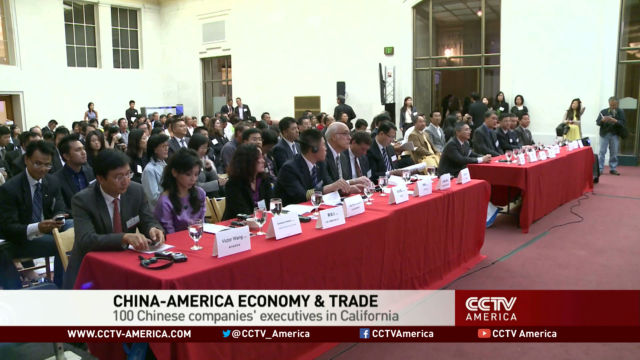Commerce officials from China’s Guangdong Province met with counterparts from the state of California at the 2014 China-America Economic and Trade Conference in San Francisco. As CCTV’s Mark Niu reports, two of the most important regions in their respective countries are focusing on boosting business across the Pacific.

A delegation of more than 100 Chinese companies arrived at San Francisco’s city hall, looking to sell Californians on doing business with Guangdong Province.
“Guangdong has opened up and become more transparent in many areas and streamlined the permit approval process,” Guo Yuanqiang, chief commerce official of Guangdaong province said.
The southern-most province in China, Guangdong has the largest provincial economy in China and is home to three of China’s five original Special Economic Zones: Shenzhen, Zhuhai and Shantou.
In 2013 for the first time, Guangdong’s GDP and international trade volume both surpassed $1 trillion.
California accounts for 13 percent of U.S. economic output and is the 8th largest economy in the world.
The city of San Francisco is also symbolic, as it’s where many Chinese immigrated to the United States in the 1800s to build on the trans-continental railroad and seek their fortune in the gold rush. Today it’s Americans who are seeking fortunes in China. For example Walmart, whose China operations began in Shenzhen in 1996, has now opened hundreds of stores in 170 Chinese cities.
Bur WalMart has had its share of growing pains, as Chinese authorities have fined the retailer nearly $10 million over the past three years for various acts, including food-labeling violations.
“The laws in China are actually quite good. Enforcement can be lacking. Do we get fines for things? Yes, we do. And usually it’s the kind of thing that we need to improve. The small things. But they add up when you have 400 stores,” Raymond Bracy, Sr. Vice President of Wal-Mart China said.
While retail, hi-tech, and the manufacturing industries have already taken off in China, representatives from both sides feel the next industry with a huge potential for cooperation is the environment.
“Protecting the environment is of utmost importance, and many problems needed to be resolved,” said Xia Xiang, the Economic and Commercial Counselor of Chinese Consulate.
“China also is facing a serious problem with their air pollution and their environment, so I think that it is a very strong synergy of partnerships that can be built,” said Brian Peck, department director of California Governor’s Office of Business and Economic Development.
As for opportunities in California, Peck touted a new competition for companies to compete for $150 million in tax credits.
No Chinese companies won the credit in the program’s first run, but the competition will continue several times a year through 2018.
 CGTN America
CGTN America

